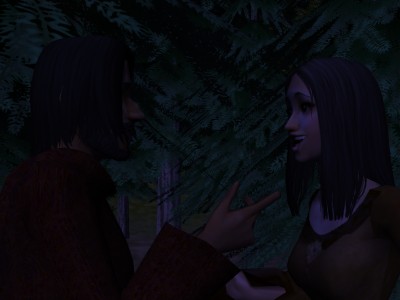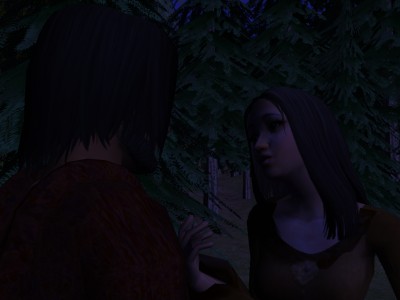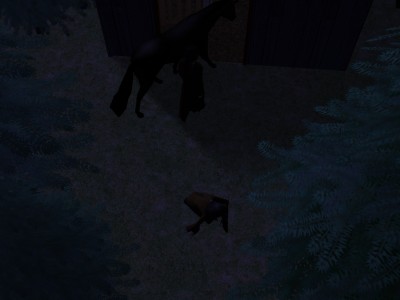
Egelric met Sela soon after sunset, while the sky still glowed with a chill blue-green light that was brightened further by the full moon. He was relieved to find her already waiting for him. They would lose no time.
“Sela, do you like horses?” he asked her after she had greeted him with a long kiss, for which he did not mind losing a little time.
“I like horses!” she said eagerly. “I see horses in de night. Men sleep in de night, and I see horses!”

“Oh, so you visit our horses in the night, do you?” he laughed. “I hope you aren’t riding them.”
“What?”
“Would you like to ride a horse tonight? Ride?” he asked, demonstrating as best he could with his hands.
“No!” she gasped. “It is don’t for me.”
“Why not?”
“Elf see it, I ride horse, it is bad. Ride is don’t for me, for Sela-elf!”

“Oh, you don’t want the elves to see you ride a horse? It is safe, you know. Please, Sela. I should like to take you somewhere, and it is a long way to walk.”
“I walk, it is walk for me.”
“Only come and meet my horse, and you will see,” he smiled pleadingly. “He is a very nice horse.”
She came and met the horse, and the two were indeed delighted with one another, but it took him much coaxing to convince her to mount. To his shame, he thought that his success was partly due to her mistaken belief that if she didn’t hop up before him, he would leave without her.
She was too frightened to speak all across the downs, but as they descended towards the river she began to relax and prattle at him again. Now, however, it was he who was too anxious to pay her much attention. Crossing the river was the part of the journey that he dreaded. They could make their way through fallow fields from the downs to the river, but to cross the river they would be obliged to take the bridge.
Sela began to grow uneasy again as they approached it. Here was the lower market of Nothelm and several small clusters of houses around the mill, the smith, and the baker, which were beginning to coalesce a village after more than a decade. Here was the great road that ran up to the keep and to Bernwald beyond, and here were the narrow roads that wound between the hamlets and the fields. And here were the men.
The hour was not yet late enough for the men to be in bed. It was early September, the thick of the threshing time, and of the ploughing and the gathering and the pruning time. The men worked hard from dawn to dusk, but at this time of year the night was beginning to come early, and because they had much to show for their work, they were merry. It was nearly every night that a number of them gathered together to light a bonfire, and the young ones danced, and their elders drank and talked until the stars were bright overhead and the horizon dim.
The sight of the men terrified her, and she clung to him with the frail-bodied tenacity of a bat to a beam.
Egelric spoke softly to her and tried to convince her that the men could not see her ears and that they could not know she was an elf, but she still understood so little of his speech that he could only hope she would be soothed by his voice. And still she pleaded, “I go home, I go in de forest,” until he thought his heart would break under the weight of his own cruelty to her. But he told himself that it was only because he could not make her understand.
The men they passed as they rode out onto the road did not seem to find their appearance strange at all. Indeed, they only seemed to note that the Squire was back to his old tricks after a few months of seeming solitude, and the more drunken of them saluted him as if he were the tutelary saint of their own revels. As far as they could see, Sela was only another dark-haired, slender-footed, wildly affectionate girl.
He had expected the bridge to be difficult. He thought she might be frightened of the water rushing beneath the hooves of their horse, although the showers of autumn had not yet come to raise the river to a more impressive level. She did not seem to mind the bridge, but it did appear that she had believed it the purpose of their journey to cross it, for once on the other side, she slumped against him and said in relief, “Now I go home, now I go in de forest.”
“Aye, we go home,” he said uneasily.
Sela turned up the face that she had buried in his chest and laid her cheek against him so that she might look out onto the deepening night.
The floodplain was far wider on this side of the river. It was only in the last year or two that farms had begun to appear here, for after a century of abandon, the fields on the other bank had been nearly as fertile as the silty plain at first, and on this side the fields often dipped unexpectedly into black marshes.
But Egelric’s horse knew well the safe paths and stayed on the higher ground, or else wended his way between the thirsty poplars that kept the earth dry. It was one of Egelric’s favorite places in the autumn, for the great stands of poplars would decide as one to change their colors, and within the space of a few days there would not be a single green leaf in sight. Looking up into a canopy of sun-gold against a deep blue October sky was more beautiful than spring to him.
Now, though, the trees were still green and shivered as they rode past.
“It is drink-water-tree, air-whisper tree,” Sela said suddenly as she reached out a hand to touch a drooping branch.
“Alred will love you,” Egelric chuckled to himself.
“It is not Sela-forest-tree, quiet-dark tree.”
“I take you to a forest you will like, Sela,” he said with another pang of guilt.
She sighed and relaxed against him, but she spoke no more until they had crossed the broad meadows and had begun to rise towards the piney hills on the eastern shore of the lake. He could see the dim specks of light that marked the work camp on one hill, and the light of the full moon was enough to reveal it as a clear-cut scar on the land. It was where he would spend his days now. But Sela was not looking towards the hills.
“Egelric,” she quavered. “What do you call dis?” she asked and waved a hand out at the lake. Its white-silted waters glowed eerily beneath the moon.
“The lake?”
“De lake, it is don’t for Sela-elf,” she whimpered. “Ride is don’t for Sela-elf. Here is don’t for Sela-elf.”
“What do you mean, Sela-elf?” he asked gently. He wanted to kiss her all over her face, so adorable was this new name for herself, but he was growing frightened by her own fear.
“It is for…” She searched for a word, and then in frustration tried to explain to him in her own tongue. This too frightened him. When she tried to speak his language, even her voice grew higher-pitched and childlike, but its low burbling when she spoke as an elf made her seem older and wiser and too much a woman to be coaxed and led about with half-truths as he was doing now.
“I’m here,” he said and squeezed her with his free arm to silence her. “We don’t go to the lake. We go to the forest.” This was entirely true.
They were soon among the pines. Their greeting to him in the stiff wind was more whistle than sigh, but there was not a sound that a pine could make that he did not love. She too seemed calmer then, and began to murmur nonsense to him again, seeming as worldly and wise as a three-year-old. He began to feel his happiness returning to him. It was not wrong, and once she understood all would be well.
She was frightened at the sight of the little house that was hidden away in the trees.
“It is men!” she whispered and hid her face again. “I go home!”
“This is home, Sela-elf,” he said softly. “There are no men here, only you and I. This is my home.”
“No! Home is here!” she cried, and pointed back up the way they had come.
“This is my home now. I sleep here.”
“You go home!” she insisted.
“This is my home,” he repeated. They rode around to the shed and stopped. “Can you jump down? Get off the horse?”
She clutched at his cloak with her strong fingers. “You go home, I go home in de forest.”
“This is home. Here is home now.” His voice was calm, but he felt sick. “Get down, Sela.”
She slipped off of the saddle and went no farther. She crouched, slightly shuddering, at the horse’s feet. He had to ride on a few paces merely to dismount.

He would have to deal with her after he saw to the horse. He watched her with one eye as he worked. Alone in the clearing, she had the look of a hare who knows itself exposed and can only huddle itself into a still ball and pray that the hawk not notice.
“Come, Sela,” he said as he returned to her. “Kiss me. Let me hold you.” He knew this would calm her.

She had soon forgotten where she was. He was able to lead her as far as the door, but she was startled at the sound of the latch.
“No!” she cried. “It is for men!”
“It is for Egelric-man and Sela-elf,” he murmured, trying to slip an arm back around her waist.
“It is don’t for me! It is no for me!”
“No, Sela, it is for us.”

She squirmed away from him, and he caught her wrist. She stopped, and for a moment she stared into his eyes, and then she tried to pull her arm away. He did not let go. He did not realize what he was doing until her gaze turned sorrowful and dropped. Then he felt the tension in her arm, and guilt flooded over him like a fever. He released her, and her arm fell limp at her side.
“Sela,” he pleaded, “all summer I have come to the forest for you. I have come to the forest, though I am a man. I am a man, and I like a house and a bed. Won’t you come in the house for me?” He was using the shameful arguments he had hoped not to need.
“House is don’t for Sela-elf,” she murmured.
“The forest is don’t for Egelric-man.”
She lifted her eyes to him, but they were still sorrowful. She no longer looked like a child.

“Sela – ” He hesitated. “Sela, come inside and I shall light a fire.”
“You make fire?” she asked, her eyes brightening like embers in a breath of air.
All through the summer he had refused to make a fire, for fear of setting the forest ablaze.
“Come inside and I shall make a fire for you. Inside. In the house.”
She leaned towards him, quivering in indecision, like a timid animal straining to take food from a man’s hand while not daring approach him.
“Come inside, Sela-elf,” he promised, “and I shall make a fire for you.” It was the most shameful argument of all, but it sufficed.







What did he expect? Did he think she would adapt to her new surroundings quickly and with no problems? The girl has lived in the forest all her life.